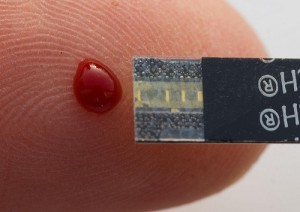Have Diabetes? You Also May Have A Heart Attack
 People often have the Hollywood image of a heart attack: a man clutching his chest, grimacing in pain and collapsing to the floor. The reality is quite different. Having diabetes puts you at an increased risk for a heart attack. Heart disease and stroke are the leading causes of death in the Latino community, according to the American Heart Association.
People often have the Hollywood image of a heart attack: a man clutching his chest, grimacing in pain and collapsing to the floor. The reality is quite different. Having diabetes puts you at an increased risk for a heart attack. Heart disease and stroke are the leading causes of death in the Latino community, according to the American Heart Association.
These diseases account for a third of the deaths among Latino women and more than 27% of deaths among Latino men. Unfortunately, Latinos in the U.S. — particularly women — are much less aware of heart disease than other ethnic groups, and this lack of awareness puts them at increased risk, since they are less likely to take any steps to prevent heart disease.
Another major risk factor for heart disease is diabetes, and the risk of diabetes for Latino men and women is almost twice that for whites. The American Heart Association estimates that among Latinos ages 20 and older, 8.1% of men and 11.4% of women have diabetes – compared to 5.5& of white men and women.
Despite the high percentage of Latinos diagnosed as diabetic, only one in four Latino Americans with diabetes know they are at risk for heart disease, according to the National Diabetes Education Program.
Heart disease is the leading killer of Latinos with diabetes.
Half a million Americans die from heart disease each year. People can reduce their risk of heart disease by learning to control their blood pressure and cholesterol levels in addition to blood sugar levels and learning to lead healthier lifestyles. If you suffer a heart attack, you have to get to the hospital as quickly as possible.
But recognizing the signs of heart attacks can be tricky. It’s not so much pain, but pressure or a feeling of heaviness and shortness of breath. If you have diabetes, the symptoms may not be obvious; you may just feel sudden, extreme fatigue. If, for example, you take a daily walk to your mailbox and then one day you can literally make it only halfway, you should tell your doctor — you may be having a heart attack!
If you have any of these symptoms, you need to call 911 immediately! The single biggest delay in getting treatment is between the onset of symptoms and dialing 911. The average time for the past 10 years has been 111 minutes. But that’s not all, not every hospital may have the proper equipment to treat you, so, before you need to visit a hospital, figure out which ones near to you have the proper heart attack equipment.
Finally, if you suffered a heart attack you are at increased risk of having another one. The doctor will give you medications to prevent another heart attack. Disturbingly, many patients stop taking these drugs in a matter of months. These drugs must be taken for the rest of your lives. If you stop taking them, you are at increased risk of having another heart attack!
We all know someone affected by this deadly disease. Please, make an effort to educate your family and friends about heart disease and what can be done to reduce these risks. Remember, heart disease is preventable!
[Photo by aldenchadwick]Jeff Kreisberg is a patient advocate, educator, scientist author of the book “Taking Control of Your Healthcare,” and, until his retirement, a professor at the University of Texas Health Science Center in San Antonio, Texas. Jeff also blogs regularly on health issues on his website, Taking Control of Your Healthcare. Follow him on Twitter: @kreisberg.
References:
http://www.stjohns.org/body.cfm?id=82
http://www.hhs.state.ne.us/menshealth/Latinos_Diabetes.pdf
http://latinopm.com/health-fitness/health/a-message-from-the-american-heart-association-6282

